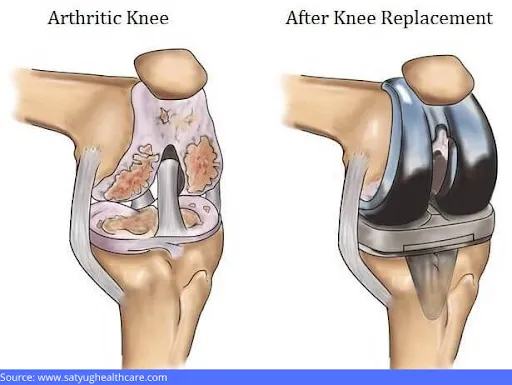Patient Review
- Patient’s Name: Mrs. Jayanti Das
- Patient’s Age: 71
- Patient’s Gender: female
Symptoms
- Pain across both knees characterized by a dull aching sensation
- Prolonged standing, walking, and activities that included sitting, kneeling, turning, and twisting made the pain worse
- Unable to perform daily tasks such as cooking, laundry, or climbing stairs
Case Presentation
Mrs. Jayanti Das, aged 71, complained of bilateral knee pain. She first experienced the soreness a few years ago but could not pinpoint when it started. Mrs. Das said the pain started slowly and worsened over time, with a few good days followed by horrible, painful days. The fear of when the pain would recur often kept her stressed out, even on the good days.
She was concerned about the deterioration of her knee discomfort. She was also unhappy about not interacting and socializing with her relatives and kin anymore due to the pain.
Physical Examination & Tests
- Medical History and physical examination
- X-rays
Post-Operative Assessment
Bilateral total knee arthroplasty

She was given an intravenous antibiotic pre-surgery, during, and post-surgery to avoid post-surgical infection. Both knees were wrapped and prepared in the standard sterile manner following an anesthetic.
During surgery, the knees of the patient were bent to expose all surfaces of her knee joints. Dr. Sandeep Singh moved her kneecap and cut away the affected joint surfaces after making a 6 – 10 inch (15 – 25 cm) long incision.
The doctor then joined the parts of the artificial joints after prepping the joint surfaces. After this, Dr. Sandeep Singh rotated and checked the bending functions of the patients’ knee before closing the incision. This was to guarantee that both knees had optimal function. The procedure took roughly 2 hours.
Physical treatment was initiated to improve flexibility. The patient was prescribed aspirin and TED (Thrombo-Embolus Deterrent) stockings to further protect against swelling and clotting. Her discomfort was controlled with medicine, and she returned home the next day.
Sutures were removed without incident.
POST-OPERATIVE ASSESSMENT
She showed a lot of improvement in her follow-up visit after 2 months. By the 5th month, she reported no pain and a full ROM (range of motion) in both knees.
Feedback
Mrs. Jayanti Das said the surgery had relieved her from the constant pain and discomfort. She now has improved mobility and overall better quality of life. She can now drive a car, navigate stairs and do her daily activities without any discomfort. Mrs. Das says she is pleased with the outcome. “I felt helpless and started to feel very low due to my inability to function as before. It made me feel incomplete and unable to engage in social activities”, Mrs. Jayanti Das said. “I had lost all hope and had started feeling more and more self-alienated”. “Then, a relative referred me to consult with Dr. Sandeep Singh. Dr. Singh heard me out patiently and assured me that he would work with me to get me better. He has given me a new lease on life. I am forever thankful to him and his wonderful team.”
Relevant Questions
Q. My doctor had advised me to get orthopedic surgery back in January, but due to work from home and pandemic i kept putting it on hold, is it risky?
You should have orthopedic surgery at the earliest after you got advised by the doctor otherwise you may feel some mobility issues.
Q. Long shifts at office is causing me a lot of pain all over my body, any tips to manage/reduce/prevent body pain?
Try gentle stretching to aid with muscle tightness, Massage the muscles, Rest, Ice can aid in the reduction of inflammation, Heat will aid in the increase of blood flow to your muscles, Nonsteroidal anti-inflammatory drugs (NSAIDs), such as ibuprofen, are available over-the-counter (OTC) (brand name: Advil) these can help you relieve back pain.
Fill in the Form for Speedy Appointment
